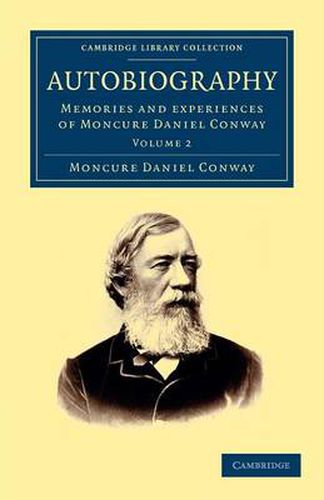Readings Newsletter
Become a Readings Member to make your shopping experience even easier.
Sign in or sign up for free!
You’re not far away from qualifying for FREE standard shipping within Australia
You’ve qualified for FREE standard shipping within Australia
The cart is loading…






Published in 1904, three years before his death, Conway’s Autobiography is a peaceful and introspective account of a compelling life. Born to a slave-owning Methodist family in Virginia, Conway (1832-1907) turned away from his roots to become a proponent of anti-slavery, free religion, reform and women’s suffrage. Observing and becoming involved in the developments of late nineteenth-century religious, political, scientific, literary and artistic thought, he formed friendships with central figures of the age, such as Ralph Waldo Emerson and Thomas Carlyle, which feature in the work alongside his devoted family life. Volume 2 covers his time in Europe, witnessing and reporting on the unifications of Italy and Germany, the Franco-Prussian War, and the birth of the Third Republic. The death of his wife and his own declining years in Paris close the work, which also tracks his ardent anti-war stance and the sad rejection of his long-standing faith in progress.
$9.00 standard shipping within Australia
FREE standard shipping within Australia for orders over $100.00
Express & International shipping calculated at checkout
Stock availability can be subject to change without notice. We recommend calling the shop or contacting our online team to check availability of low stock items. Please see our Shopping Online page for more details.
Published in 1904, three years before his death, Conway’s Autobiography is a peaceful and introspective account of a compelling life. Born to a slave-owning Methodist family in Virginia, Conway (1832-1907) turned away from his roots to become a proponent of anti-slavery, free religion, reform and women’s suffrage. Observing and becoming involved in the developments of late nineteenth-century religious, political, scientific, literary and artistic thought, he formed friendships with central figures of the age, such as Ralph Waldo Emerson and Thomas Carlyle, which feature in the work alongside his devoted family life. Volume 2 covers his time in Europe, witnessing and reporting on the unifications of Italy and Germany, the Franco-Prussian War, and the birth of the Third Republic. The death of his wife and his own declining years in Paris close the work, which also tracks his ardent anti-war stance and the sad rejection of his long-standing faith in progress.